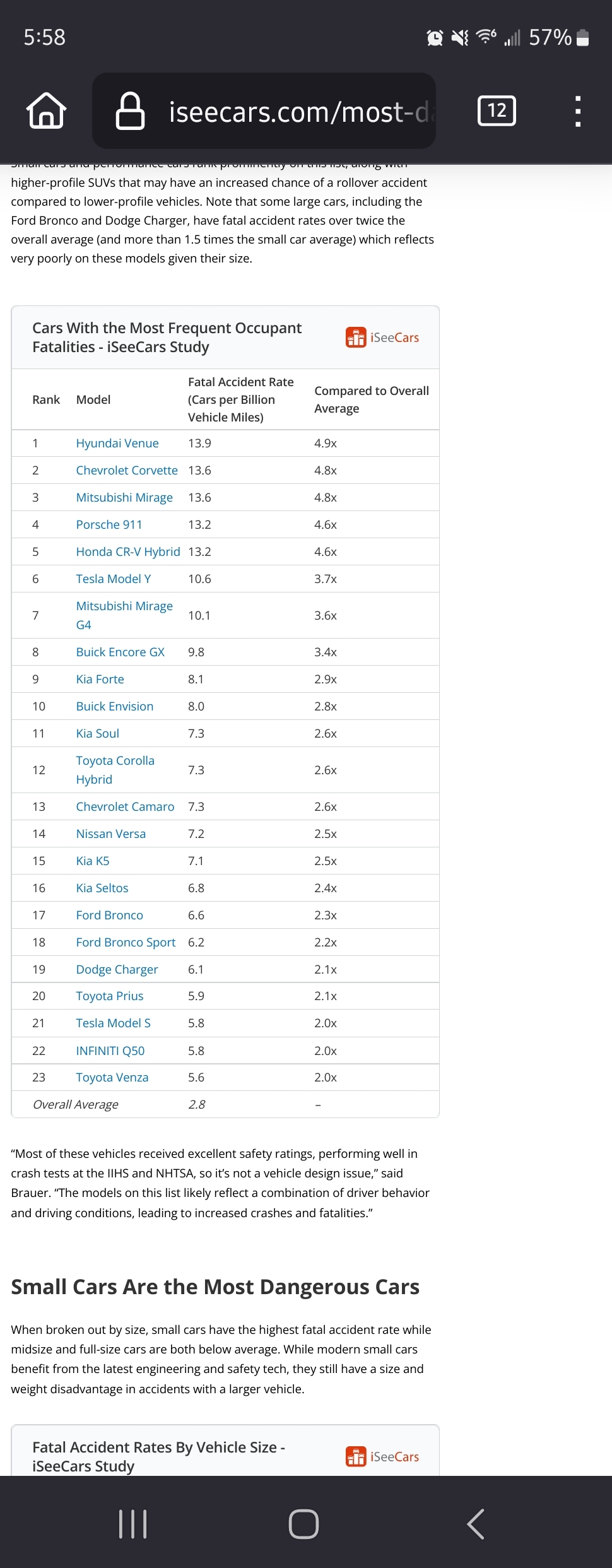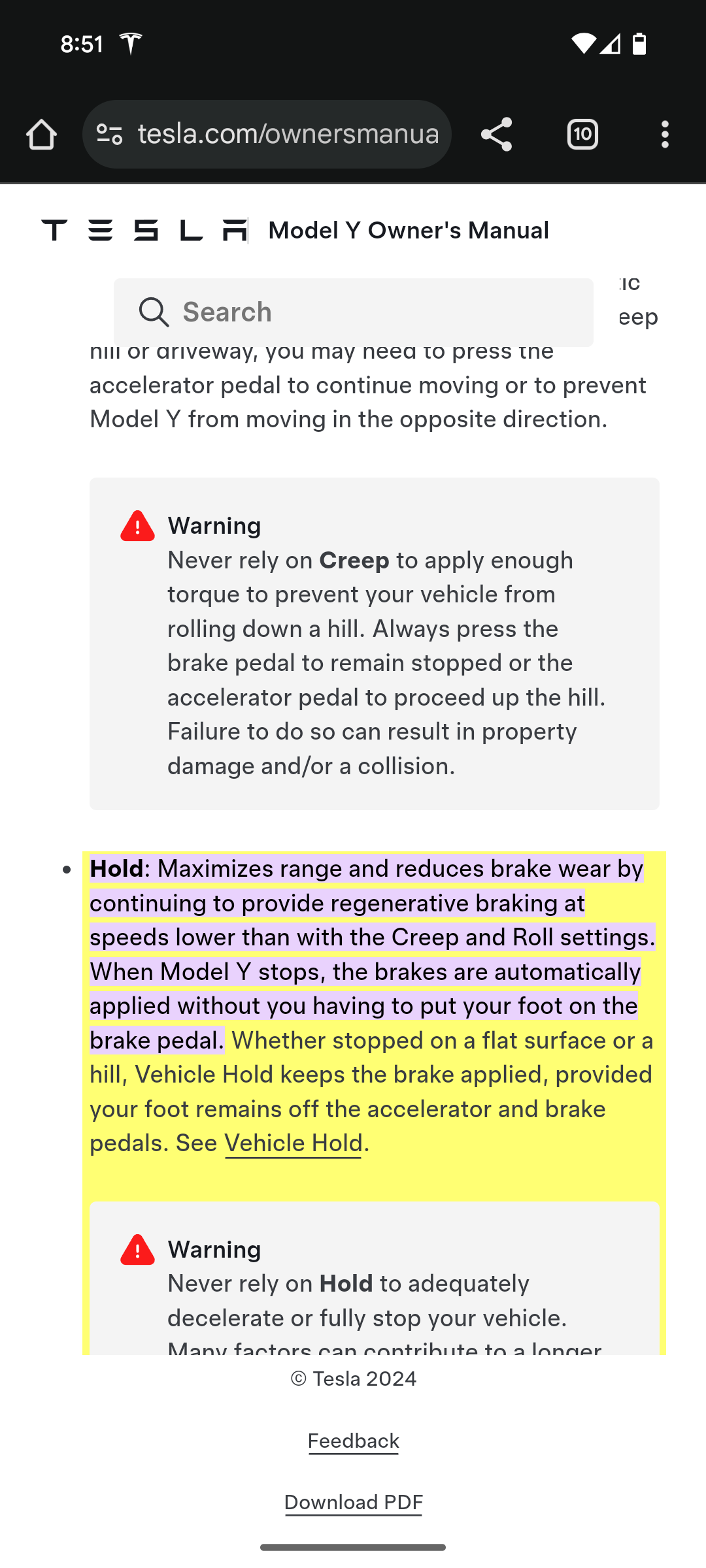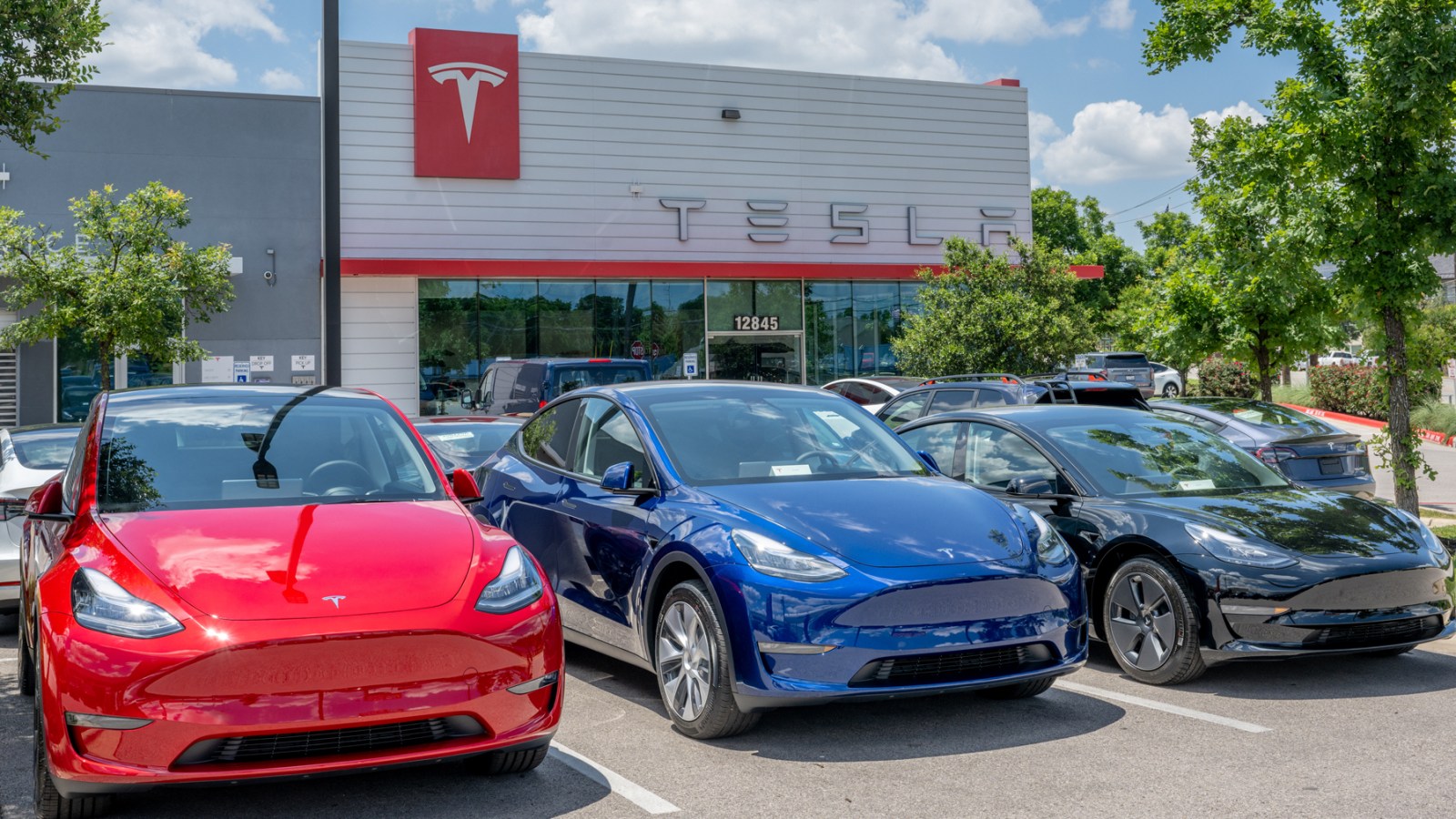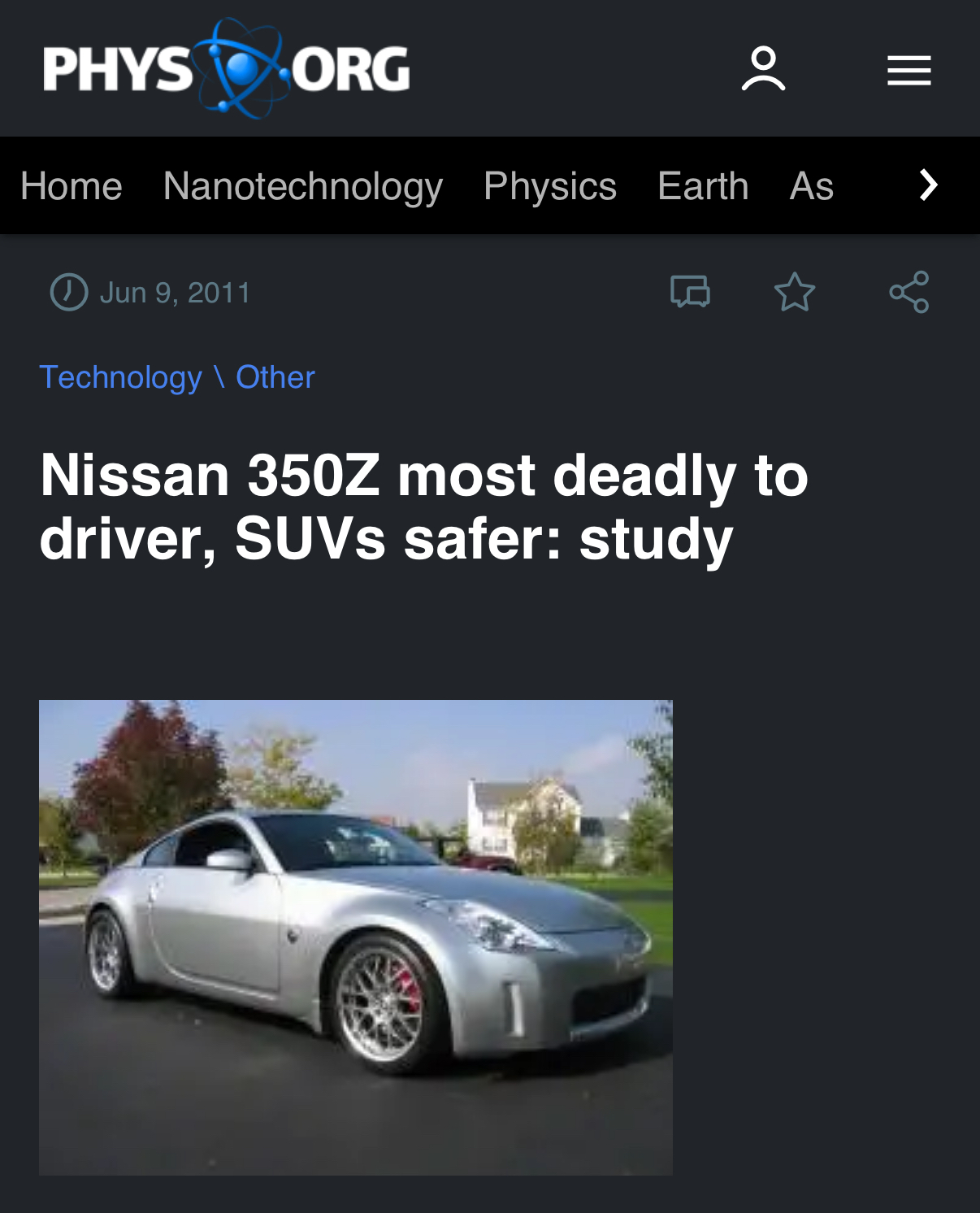Automotive research firm finds that Tesla has higher frequency of deadly accidents than any other car brand
Which is odd, because most electric vehicles (including some models of the Tesla) have better crash ratings due to having a crumple zone where the engine would be. Assuming that’s still true, there must be another factor that tips the balance towards deadly accidents. Some thoughts:
- They are heavy cars. Maybe it’s safer for the passengers but more deadly for the other vehicle.
- Maybe Tesla drivers are more irresponsible than other car owners.
- Maybe the torque and acceleration is too high, causing people to lose control more often.
- Maybe something that doesn’t get rated in the crash ratings causes deaths, eg. electric locks which are unable to open when power is lost, a likely scenario during collisions.
- Maybe the FSD features are causing more collisions to happen.
Maybe Tesla drivers are more irresponsible than other car owners.
That was going to be my suggestion.
More irresponsible than Nissan Altima or Dodge Ram owners isn’t easy
Most deadly to driver is not the same thing as most deadly. SUVs are usually extremely deadly to pedestrians and other road users.
As an SUV driver in Appalachia, I’ve mostly only injured pedestrians.
Anecdotal, I know. I’ve only killed 2 people. What’s the average?
Now I won’t sleep for fear of jinxing myself.
Being human is stupid.
please be kidding because otherwise im a terrible person to have laughed my ass off to this 😂
Of course I’m kidding lol.
Am I being wooshed, and if no, wtf? When did killing even one person become an “only” occurrence?
My wife mowed down this guy once in downtown ottawa. We still have the commemorative dent on the hood :)
Altima owners
…This is a stereotype I’ve never heard before.
Let me bring you up to speed fam.
If there’s a systemic reason Tesla drivers have more accidents in a Tesla than drivers of other cars, that car is inherently less safe.
You can’t simply put it down to “Tesla drivers suck”, that’s irresponsible and flawed logic.If it’s the acceleration, maybe we shouldn’t have cars that accelerate the way a Tesla can. But I very much doubt that is the reason except anecdotally. I suspect more that safety features may in fact serve to distract, or people “learn” to rely on them, and than they turn out to not be 100% reliable.
We’ve all heard the weird tendency of Tesla breaking for no reason, that is hazard, also the turn signals are placed wrong, causing them to be impractical in some situations like roundabouts. Also the instrumentation in general of a Tesla is centered very much around the touch screen, another source of potential distraction. AFAIK even the speedometer isn’t placed where it should be to observe it quickly without looking away from the road for too long.
A lot of inherent safety feature in traditional cars, have been shaved away in Tesla cars. Even getting out in an emergency can be a problem, as the handles may fail because they are electric, and the “real” handles are hidden.
There a dozens of examples where Tesla is designed for less safety than traditional cars, and if (when) the safety features fail, I bet they are a lot less safe than if those features weren’t there to begin with.
Tesla cars are designed with a VERY strong focus on reducing production cost, Elon Musk is even boasting about it, and how he has an uncompromising goal to simplify production. But Tesla also lack the experience about why things are like they are in traditional cars.
The systemic reason might just simply be “They were the kind of a person that would buy a Tesla”.
If I wanted to buy a safe car to drive responsibly while respecting all the traffic rules, an EV with almost a thousand horses with a 0-60 time of 2.1-2.4 seconds wouldn’t exactly be my first choice.If you want a more environmentally friendly car, which would you prefer: A Tesla or a Prius?
A lot of Tesla cars were sold when there were very few to no alternatives if you wanted an EV.
Also 2.1-2.4 is not normal for a Tesla. That’s the very fastest of them.Prius. Teslas are way too large and heavy for my tastes.
Though preferably I’d swap my VW Up to an electric one, they were too expensive back when I got mine.As for the acceleration figure, I took it from this review:
We haven’t tested a standard Tesla Model S for some time, but a 2020 model that we ran through our instrumented test regimen reached 60 mph in a blistering 2.4 seconds. You can expect roughly similar performance from the current standard Model S today. The gonzo Plaid version, which boasts a third electric motor and 1020 horsepower, reached 60 mph in just 2.1 seconds in our testing.
We have had an e-UP for 3 years. We have ended up driving more in that than in our “primary” car which is a Golf. Had an ID5 as a loaner once, and it was great to get our UP back instead. If only the ID3 could tow our 1200kg caravan, that would be an ideal replacement for the Golf some day. Most electric cars are too large and heavy for my taste as well.
Tesla seems to me like a performance car that’s sold as a luxury car. I think a lot of drivers bought it when they might not be able to handle them. Anecdotally, I remember my mom spinning out at a light years ago after she bought a used luxury vehicle that was actually a powerhouse.
That being said, your points are more then valid and user error is at most a small part of the equation.
Neither. Consumption isn’t environmentally friendly, it’s liberal greenwashing from leaders who think we can continue to consume infinite resources on a finite planet.
That’s bullshit. EU has halved pollution and energy consumption since 1985, don’t tell me it doesn’t make a difference to work towards sustainability.
The raw materials don’t grow on trees and aren’t renewable. EVs are a fantasy solution that doesn’t actually solve the problem. The batteries are full of rare earth metals and toxic as fuck.
The problem is consumption itself, but rich Europeans such as yourself pat yourself on the back for being so virtuous when really all you’re doing is replacing one kind of pollution (dead dinosaurs) for another (rare earth metals).
And as we’ve seen with environmental regulations for shipping, now that the ships burn cleaner fuel there’s less pollution, which means less particles for sunlight to reflect off of in the air leading to faster global warming. An unexpected negative side effect of reducing pollution.
Then there’s the freedom issues with EVs. They’re expensive as hell, you can’t work on them yourself or with an independent mechanic, and they can get bricked remotely whether by bad software update, because you missed your payment that month, or a cyber attack. Sorry but if they can brick my $500 phone with a software update there’s no way in fucking hell im allowing these tech companies access to a $25k car. The capitalists will find a way for planned obsolescence so this way the line forever goes up.
Fuck that I’ll take the ICE with minimal computer bullshit in it everyday. My 2013 Subaru Impreza with 230k miles on it is more environmentally friendly than buying some stupid new EV for $50k that I don’t have. Keeping an efficient ICE car on the road for as long as it will drive is more efficient than trading it in for any EV. Raw materials don’t grow on trees.
100 companies produce 70% of the worlds pollution (not including the US military which is the largest single polluter in the world) fuck this EV and no plastic straws or bags bullshit. It’s not on individuals. Capitalism itself needs to be fucking overthrown if we have any chance of stopping climate change. And it’s already likely too late - the time to overthrow was in the 90s and people tried. A whole lot of leftist groups in the US got thrown life in prison as “terrorists” for it. ELF and ALF.
deleted by creator
You’ve been listening to a lot of anti EV propaganda.
the hybrid electric engine of the Prius line, produces enough greenhouse gasses in the production of a single Hybrid/EV car to completely eclipse the lifetime operating emissions of a single ICE car.
This myth has been thoroughly debunked multiple times, even from official sources:
https://www.epa.gov/greenvehicles/electric-vehicle-myths
FACT: The greenhouse gas emissions associated with an electric vehicle over its lifetime are typically lower than those from an average gasoline-powered vehicle, even when accounting for manufacturing.
The electricity that powers the Tesla might be “clean”, but if it was produced by burning fossil fuels at a power plant, it’s just shifting the method of combustion
No even if a Tesla drives on pure coal based electricity it’s still slightly cleaner. Because powerplants are more efficient than a car engine and don’t idle, and the emissions are more efficiently treated from a powerplant. This is also when accounting for transportation and charging of the electricity, but without accounting for the waste when producing and transporting the fuel to suit an iCE car. So there is a healthy margin in favor of EV and PHEV. So even when driving a Tesla in say Poland which is the most coal heavy country in EU, an EV still pollute less than an ICE car. When you drive it in for instance Denmark, France Sweden, the EV pollute less than a fourth of an ICE car.
it’s arguably worse than economy ICE alternatives
Yeah an economy ICE is obviously not as bad as a NON economy. For more than half a century, We’ve had the option to mandate “economy fuel consumption” on cars, but haven’t done so. I agree that that’s a failure of policy.
I am convinced it’s the acceleration. Also because you have that ability, it influences you to take risks in traffic (eg. Pulling out of a stopped lane) that you might not take in an ICE car because you can’t hit a high scored fast enough. They opened Pandora’s box by making every family car a Porsche.
I haven’t noticed that at all for Tesla, and I did absolutely notice with BMW and AUDI for many years. Not so much driving fast, as driving like assholes. Yes an EV often starts quicker at a read light, but I’ve never seen anything wild here that I recall, and we have a lot of Tesla and other EV cars here now (Denmark).
But to be honest, it may be different here, because ICE cars are generally manual, which is way more fun to drive. With A Tesla you just press the speeder like an Automatic. It just responds faster. But a Tesla can also be driven for comfort, and it seems to me that’s what just about everybody does here.
Luxury car owners are rich so they behave like the privileged assholes they tend to be.
Even getting out in an emergency can be a problem, as the handles may fail because they are electric, and the “real” handles are hidden.
This killed a billionaire a few months ago… maybe not such a bad feature
When this was posted last week, I mentioned that it was odd that all the most deadliest models on the list were all low production cars, meaning there might be something wonky with their methodology.
There was a similar “study” done a year or so ago where they simply looked at car insurance applications and used people’s accident history and whatever vehicle they were trying to insure at the time to generate a list of which models had the “most accidents” in an incredibly flawed manor (Pontiac and Oldsmobile were among the safest even though neither company exists anymore).
The study said they normalize by mileage, which will account for both model popularity and driving distance. Driving safety is usually reported in incidents per mile or something to that effect, so that’s all standard.
The data is by “Fatal Accident Rate (Cars per Billion Vehicle Miles)”, Model Y having 10.6, Model S having 5.8. Ignoring Model 3, the average would be 8.2. Back in 2023 Tesla tweeted “Total miles driven by the Tesla fleet has exceeded 100 billion miles globally—equal to 532 round trips to the sun!”
So that math says 820 fatal accidents, Tesladeaths reports 614. I’d say the numbers seem close enough?
Or, hear me out, maybe they are just shit because so many corners have been cut in manufacturing that tesla cars should be perfect spheres by now.
Maybe Tesla drivers are more irresponsible than other car owners.
This is my first thought. Anecdotally Tesla drivers joins the ranks of Audi and BMW of insane drivers around me.
Eh, I’ve seen the opposite. Most of the Tesla drivers in my area seem to drive relatively slowly. Yes, Teslas can go fast, but that burns through range like crazy, so I think a lot of them want that better range.
BMW drivers here are the worst because act completely entitled. They’ll cross multiple lanes on the highway w/o signaling, aggressively pass on the right just to slow down to the speed of traffic again, and they’ll park across multiple parking stalls. Audis are similar, but the demographics seem to skew a bit older.
Here are the main demographics I tend to see in my area (Utah):
- wannabe cowboys - big lifted trucks
- rich “racers” - BMW, sports cars (mostly Corvettes here), etc
- entitled “family” types - huge SUVs (esp. Cadillac Escalade)
- “outdoorsy” people (and wannabe “outdoorsy” people) - Subaru
- wannabe “green” people - Tesla, Rivian, etc
- actual green people - Chevy Bolt, Toyota Prius
The first three drive super aggressively, the fourth can vary, the fifth drives pretty normal, and the last tend to drive pretty conservatively. At least that’s my read from my area.
That’s Exactly my experience with Tesla drivers too (Denmark), Tesla drivers generally drive “comfortably” as I see it, and I’ve never seen a Tesla show off at a red light.
In my experience Tesla drivers are responsible drivers as much as everybody else. So I am pretty sure this is NOT a driver issue.
I think of tesla drivers like BMW drivers who aren’t good with their money.
They’re a cross between BMW drivers and incapable Prius drivers from the oast when they were the first hybrids.
Aka, you have the douches driving like entitled dicks because of the speed and prestige of the brand, and then you have the eco focused clueless drivers putting around.
I tend to keep a wary eye on all teslas because either way, they’re unpredictable.
My bet is on the extra torque being the primary problem. Rental companies have complained about increased incident rates, and they’re probably not renting out Teslas.
Hertz has had Tesla’s most of the time I’ve picked up a rental
And they did U turn on that. June 2024:
Hertz is dumping Teslas onto the used car market. The rental car agency made a huge mis-step by ordering too many electric cars, and now it’s rushing to offload 30,000 EVs. Tesla makes up roughly one-third of all of Hertz’s global EV fleet.
Since January, Hertz has been aggressively offloading teslas at the nationwide average price of roughly $25,000, according to CNBC. Earlier this year in a regulatory filing, Hertz said, “expenses related to collision and damage, primarily associated with EV, remained high.” in the first quarter, Hertz took a $195 million write-down for depreciation of its EVS.
This is my hunch too. Perhaps the UI is more distracting with Tesla’s implementation of screens/menus/feedback for car functions too.
Just pointing out the study emphasize occupant fatalities which I take as to exclude external fatalities such as other vehicles.
Oh yeah, the big infotainment system could definitely be a factor in bad driving.
Also thanks for pointing out the methodology on how they’re counting fatalities, that easily scratches one item off my list.
Re bullet 2. Irresponsibility.
My theory is that it is isn’t the badge on the car, it’s the fact that people’s grocery getter now was the performance of a high-end sports car from a decade ago. And, like a with a sports car, Teslas are designed to encourage users to have “fun” driving. Every test drive from a Tesla store ALWAYS includes a segment where the store rep encourages people gun it onto or on a large open road.
Before Telsa it was the German manufacturers who dominated the commuter-car-with-sports-car-performance market. And guess what? Those people drove like a-holes.
Those people drove like a-holes.
That is not true. I mean the bit where you put that into the past tense. They still do.
"A vehicle’s size, weight, and height certainly play a part in its ability to protect passengers in a crash,” said Brauer. “But the biggest contributor to occupant safety is avoiding a crash, and the biggest factor in crash avoidance is driver behavior. A focused, alert driver, traveling at a legal or prudent speed, without being under the influence of drugs or alcohol, is the most likely to arrive safely regardless of the vehicle they’re driving.”
I expect (hope) it’s a small factor, but I wonder where pedestrian fatalities fit in. Several of the worst models seem to be large SUVs or sports cars - alongside these Teslas and some rather cheaper compact cars.
Pedestrians were not part of this study.
oh yeah, “… at least one occupant fatality”.
The source dataset seems to have pedestrian/non-occupant fatalities, pretty shitty of tthem to go out of their way to exclude them.
Large SUVs must be worse for pedestrians because they’re essentially tanks that you can’t see out in front of for a good 20’ or so. A small child running to get their ball in the road will be completely invisible to a large SUV whereas a Tesla driver would be able to see the child a lot sooner and hopefully avoid them.
Last time I looked up publicly available crash statistics in the US and calculated the per-maker numbers, Tesla was like 1/80th the typical per capita crashes of the average auto maker. That was a few years back, but I doubt that’s changed without some sketchy statistic interpretations.
they used crash statistics for new cars with models from 2018 to 2022, where tesla is the most dangerous brand
They looked at fatal crashes only, which is presumably a very small share of all crashes. They also normalised to per mile driven using a sample of data they have - presumably some data on miles driven by car type.
Could be sketchy, could just be a much smaller sub-population.
Obligatory preface written after comment was written:
I am in no way a statistician or data analysis guru. I admit I could be looking at this shit entirely wrong and welcome anybody who corrects anything I I’m looking at incorrectly.
Actual comment:
The entire report itself is skewed as fuck before Rolling Stone cherry picked the fuck out of it for the article to slam Tesla. Listen I’m as sick of Elon as the next but these fucking shit on everything Elon hiveminds are so much more fucking obnoxious. Theyre always 10 to 1 comments by people who didnt read the article to comments by people who did.
At the end is the actual image from the site that issued the report. I didnt bother with a source link because it’s right in the article OP posted.
Issues with the article and report:
-
The figures are not for every car on the road it only covers cars made between 2018 and 2022. Not a big deal but still deceiving as fuck to theme the article as Tesla has one of the highest death rates. Cuz they left the time frame out of the RS article. Kinda how they left out the fact that only 1 tesla is in the top 6 and the other Tesla is second to last with a flood of much larger much more common vehicle names that fill in between 1 and 23.
-
Each rate is calculated off 1 billion miles driven per year. When you put any Tesla model up next to any Ford, Honda, GM, Toyota, etc the % of all teslas on the road are going to be ridiculously higher than the % of the other much larger industry makes and models on the road that it takes to reach 1 billion miles. Because idk if I explained that well here is a made up scenario to illustrate it. Let’s say there are 1000 teslas on the road compared to 1,000,000 Prius on the road. The tesla death rates are based out of 1000 Teslas driving 1,000,000 miles each. Whereas the Prius death rates are based off 1,000,000 Prius’ driving 1,000 miles each.
-
Remember point 2 as it plays into point 3. The method they used to calculate the rate outlined in point 2, I believe is normal when govt is figuring out vehicle death rates by category, location, driver age, etc. However the study they reference is specifically for death rates per vehicle make. Which makes the methods used for calculating deathrate by make and model completely fucked. They should’ve done the same number of cars per each make and model type as well as the same miles driven to get a comparable outcome of death rates per make amd model over 4 year span.

-
But all they did was market their pretty good lane-assist and automated braking as a magic butler that lets you nap in the driver’s seat.
How could this happen??
It really shouldn’t be legal to call it “full self driving” unless you can take a nap in the back seat.
It shouldn’t be called “full self driving” unless the company is going to cover the collision part of my insurance.
When insurance companies start writing policies that allow me to pay less for coverage if my car operates entirely autonomously, that’s when I’ll start taking car automation seriously. Until then, I’ll assume all of these car companies and robotaxi services are just blowing smoke up my ass trying to convince me that this is the future of driving. Sure, it might be in somebody’s future, but as long as I’m liable for what my car does while it’s in motion, I’m going to insist that I remain in control of the vehicle. Lane/braking assist are all wonderful, but it shouldn’t be a substitute for human awareness, it should be a supplement.
It’s actually not. Tesla just won’t care until the feds sue them in court for it.
Two Tesla owners got so mad…
deleted by creator
I work as a valet driver and the Tesla - unlike any other car including the newer EVs from other brands - seems like it was designed by people who have never driven a car. Ever.
Call me crazy but having nearly all the controls in a stupid idiotic touch screen where you have to scroll through multiple menus for basic car settings is a terrible idea. And so is braking by letting off the gas.
And the people who buy them tend to be a certain kind of person… not the brightest
People always clown on BMW drivers, Tessholes are the absolute worst.
Teslas replaced bmw for sure, now I’m just like “sure they are dicks but at least they can drive” while teslas are mostly dicks who don’t know how to drive.
They were bad before teslas existed! Benz drivers too
Braking by letting off the gas? So you can’t coast, it’s either go or stop?
Yeah and I HATE it. I drove my cousins Tesla when it first came out, way before musk started publicly acting like the douchebro he is and before there was really a Tesla fanboy club with a bunch of wannabes slobbing musks knob online.
I think I drove it in the neighborhood for like five minutes, stopped and parked the car and asked my cousin to drive it back. Hating it is an understatement.
Last year all the valets and I agreed we won’t be parking Tesla’s because of how much we hate them, but management overruled us this year.
I’ve been driving for 20 years. I shouldn’t need a lesson from a Tesla owner on how to drive their car. The fact that I do shows how fucking dangerous they are. They’re not designed by people who drive and it’s so fucking obvious that the computer nerds who design them get chauffeured everywhere by Ubers.
Until I lived here I wouldve assumed that last line about Ubers was an exaggeration but…yeah, a huge portion of the bay area strategic techbro reserve actually can’t legally drive. Then once they turn 28 and move to the burbs they lost a full decade of learning and they shift from not legally allowed to just “shouldn’t”.
Yeah I understand why people don’t get their licenses living in cities there’s really no reason. But ability and semi frequency of driving a car should be a prerequisite for being hired to design one.
Yep. Obvs there’s a lot more than goes into a car than just the UI but…I don’t trust user experience engineers. Some of them gave us the Mac os. Other gave us windows 11. Others gave us gnome. None of them should be allowed near the UI for a 2-ton metal brick on wheels. “But what if we compressed all of the icons in one to get a ‘clean’ design and then had a 2 second fly-out animation to show you what they all are”
Yeah they absolutely do not need to be making the decisions. Car designers should be designing cars not UI designers or software engineers.
Designs have been relatively standardized for decades for safety. every other car out there I haven’t needed to talk to the owner to find out how to drive it, I just drove it. But teslas I’ve had to ask…
That being said I once spent a solid 10 minutes inside an electric Porsche trying to figure out how to turn it on… the power button is to the left of the steering wheel in the strangest spot. Then there’s the newer cars with their weird toggles and what not but it doesn’t take too long to figure out how to shift.
deleted by creator
Hard disagree on this one. The regenerative braking has a learning curve yes, but the pros outweigh the cons imo. When you brake (in a traditional car or an EV), you are wearing out yor brake pads, turning friction into heat. Done right, renerative braking means almost all energy is captured back, and even lower maintenance by not bothering the brake pad.
It takes getting used to, you hate it at first, which is why tesla has an option to disable it, but there is a reason why most people who own Teslas use it, and other EVs are getting it as well.
Regenerative braking is good thing, yes .But implementing it as one pedal driving is terrible. Other OEMs like Ford or VW blend regenerative braking into the brake pedal of their EVs such that it feels exactly like a normal car. The friction pads are there for either emergency braking or for bringing the car to a final stop after slowing down.
I drive exclusively in 1-pedal. It’s a pretty quick transition.
Probably easiest to make an analogy to the transition to analog sticks for gaming.
It was a bit difficult but, once you get the nuance, it’s pretty game changing.
I drive my ID.4 exclusively in normal drive mode. I tried one pedal driving and hated it. I don’t understand the hype. To each their own. My point was that regenerative braking doesn’t depend on one pedal driving.
I haven’t driven the id.4, but our car has a visual indicator that shows the percentage of regenerative braking efficiency achieved when you at coming to a stop. Hitting 100% is significantly easier in my experience with my test sample of 1 vehicle using the single pedal option, like everything though, I’m sure it’s not the same across the board.
deleted by creator
The complaint isn’t that regeneration is bad, because that’s been part of any battery vehicle since the first Prius in 1997. The complaint is that while Toyota solved this problem before much of Lemmy’s userbase was born, only Elon decided to make the car behave fucking weird.
deleted by creator
Lot of assumptions in this thread about how terrible one pedal driving must be. No, you can just set the car to coast like normal if you want. There’s still a brake pedal of you need to slam the brakes. One pedal driving takes maybe an hour to get used to, but once you learn it you won’t want to go back. There’s a level of regen that can be adjusted, and you quickly learn how fast that is. I generally have my foot set at a certain level to maintain a speed and if I need to stop at some lights I’ve gotten very used to when I need to lift my foot up for the regen to stop me at the right spot.
It’s called regen braking and puts energy back into battery. You can also control how strong the regen is in settings.
I prefer strong regen and hold mode. The car will slow as soon as you release the accelerator pedal. Hold mode basically means the car stays put when it’s stopped until you press the accelerater. Creep mode would have the car roll forward when you release the brake.
The one pedal driving works really well but there is a small learning curve. I would find it a bit annoying to switch back and forth like the valet guy.
Regenerative braking happens through the brake pedal on my Ford PHEV. I prefer it, because it drives the same way every other car does but still allows you to stop with 100% regenerative braking as long as you don’t press too hard on the pedal.
I like the instant response and feel its safer since the car will already be slowing down by the time I mash the brakes.
Do you put your foot over the brake and maybe hold some pressure on the pedal?. Just asking as I’m going to just put this out there If not your doing it wrong. As a responsible driver your foot must at least press the brake pedal to hold you still and I’ll tell you why. What if you get hit from behind. Where is your foot? Over the brake or gas? Most people like 99 percent tense when hit with sudden stress. But are you going to clamp down and shoot into traffic or help everything behind you also come to a stop?
I do not put my foot on the brake when its held. It does apply the brakes when the car stops so that should take care of the being rear ended issue.
No they don’t. The hydraulic system is not used to stop you at any time unless your foot pushes that peddle. Do use your actual brakes everyonce in awhile so they don’t rust into place and fail to work when you need them.
I’ve had the car for 5 years, I’m familiar with how it works.
I did not say that the car uses the brakes to stop. I said that with hold mode, it applies the brakes once you are stopped. Also there is a mode to blend brakes with regen. This is used when the battery can’t accept any energy via regen. Usually when the charge level is close to 100% or the battery is cold. In order to provide consistent dynamics, the car will auto use brakes to make up for low regen.
Here’s the manual for hold mode.

Oh that the very bottom it says never rely on hold to ever anything that is literally their caveat to they are not liable to you. put your foot on the brake.
Regen breaking. My guess they can’t bake it into the brake pedal because some rules for what a break pedal is allowed to do or just bad design. Both very possible.
Bad design. Plenty of EVs have their brake pedal apply a mixture of regen and friction braking, with the actual proportions dependent on factors like how quickly you hit the brake (soft braking is entirely regen, slamming the brakes apples almost entirely actual brakes in my experience), or how much charge is in the battery (you can’t safely pump power from regen into a nearly full battery).
Plenty of them also let you control how much passive regen happens when you lift the pedal, with the default on mine at least feeling very similar to the slowing you get when lifting off the gas with an automatic transmission. It’s adjustable from none at all to moderate braking force, and when I turn it up lifting my foot from the gas illuminates my brake lights.
My Ford PHEV does regenerative braking through the brake pedal. The brake pads only engage if you press hard enough that the braking demand is higher than the slowing caused by regenerative braking. It will show you how well you’re doing with a gauge to show how much of your regen-braking force you’re using, and if it never engages the brake pads until you’re already stopped (for the brake hold function) it tells you 100% of the braking energy went into the battery. Pretty cool.
Any decent car in the tesla price bracket has configurable regen from all the way off to progressively more regen all thr way up to one pedal driving that will apply the brakes for you to come to a complete stop without touching thr pedal.
Vast majority of these it’s switched between the modes using the paddle shift. If you can understand changing gears on a modern ice auto using the paddles, then it’s not beyond the average driver to quickly get to grips with using it for regen.
I’d you feather the throttle as you start to slow down you can moderate the amount of regen dynamically without having to change modes. However that requires more skill than the average driver seem capable of.
Cheaper evs tend to have off, on, and may be one pedal driving modes, but they have to cut things to be cheaper as with all cars.
I get between a fifth and a quarter back of my energy consumption from using regen. Learning how to use it is essential for good economy, and it makes you safer as you plan ahead more for where you want to slow down. The least safest way to drive is emergency braking 10m before a stop sign as your default driving style
deleted by creator
Tesla have a CVT gearbox? Like actual gearbox that ice cars have? First, I’ve ever heard of them having a proper gearbox. First production ev I heard of with an actual gearbox is the taycan, that has a two speed, fully auto gearbox. Nit aware of any others with an actual gearbox.
You know how regen works right? And that the brake pedal on modern evs don’t engage regen as fully as they are engaging the brakes as that’s what that pedal is for. Engage the brakes and you aren’t going to get anywhere near the energy back from regen as a ton of energy is being wasted by friction and thus heat of the brake pads.
I’ve owned a lexis 400h, i like the idea of them, but cvts are garbage to drive, even in hybrids. They also completely unsuitable for evs due to their wide torque band, they work best for ice engines have have narrow torque bands as the entire function of a cvt is to adjust to a narrow rev range to optimise that narrow torque band.
If you wanna coast just use cruise control. Otherwise you have to keep the “gas” slightly pressed to maintain speed. It’s way better but the very real downside is that you forget how to drive ice cars.
Couldn’t agree more.
B-but it looks so sleek and clean! Who cares about safety!
Does it? Looks outdated to me.
My Nissan Leaf has the one pedal regenerative braking and I prefer it because you are not wearing down your brake pads and rotors. Thankfully, Nissan continues to use buttons and not a bloody touch screen. I agree with you on that point.
Idk I live where there’s snow on the ground six months out of the year and I like the finesse one gets by being able to let off the gas without braking. Braking can trigger a spin or loss of control in slick conditions.
+1 Indeed!!! My Leaf has winter tires, a heavy ass battery in the middle and the constant regen braking pressure keeps the car under control. Accelerating, this thing leaves the ICE powered pick-up trucks and SUVs in my mirrors. It really surprised me.
But one doesn’t want all that torque when starting in snow. Too much and wheels spin out. Not enough and you lose traction and slide.
Winter tires and don’t press the pedal to the metal.
I rode a Tesla Uber once and the guy clearly didn’t know how to drive it because we were lurching forward and backward while just going down a straight road. We got carsick.
That sounds like he doesn’t understand how to use one pedal driving.
deleted by creator
I think it’s a huge factor in the increase in traffic deaths. That, inexperienced new / rusty drivers after covid, covid fucking with peoples brains, bigger heavier faster vehicles, increased day to day life stress.
No way bro, single pedal driving is amazing. There’s also voice commands and you can hotkey stuff to the left scroll wheel (I use it for toggling chill/performance mode), and you can put it in autopilot if you really gotta use the touchscreen - but how often do you need to do something not covered by voice commands steering buttons?
No way bro, single pedal driving is amazing.
What’s amazing about it? Seems
intuitiveunintuitive as hell but I’ve never actually experienced it personally. How do you control how fast you stop or just coast? What if the electronics fail? My car the brakes are mechanically connected to the pedal, if the power brakes go out I can still brake without them (although it is much more difficult).edit: that was supposed to say UNintuitive
Your speed is directly tied to how hard you’re pressing the accelerator. You don’t have to guess momentum. If you fully let go the the accelerator, your rate of deceleration is tied to how much you can regen. If the battery is too full, the regen brakes can’t absorb as much (the metaphor I like is imagining a full piece of luggage, it’s hard to jam it from 90 to 100% full) - so instead of slowing the car down and not being able to absorb the energy, it’ll just not slow down as much so it doesn’t give waste energy - - this is actually pretty dangerous, so now there is a setting so that in situations like this, the car will use the real brakes so that you have a consistent maximum deceleration when letting go of the accelerator.
If the computer crashes the screen goes black so you lose the speedometer. It even rarer now and reboots quickly but obviously if you have a first time passenger they’re gonna freak out. The car still has a normal brake, you just never use it since you wanna max the regen. If you use the real brakes, and browse the energy consumption screen it’ll let you know how much battery you’ve wasted by not using regen and, if you have the safety score enabled you will probably get shit on for driving unsafely (if you need to use the real brake this means you are exceeding the capacity of the regen brake so yeah you’re doing something erratic) - in California, this safety score cannot be used against you for insurance rates.
Only the cyber truck is full drive by wire. Idk the extent of it but there should be “mechanical connections” in the other cars. There’s also a mechanical door handle that damages the trim if you use it (tell your passengers how to properly open/close doors)
Don’t test drive unless you have the money to buy, lol. I already kinda knew I was gonna get one (I had just gotten hit by a drunk driver and used it as a catalyst to upgrade since I really wanted the FSD), but I was sold on the instant torque and the one pedal driving. You just envision yourself wanting to pass someone on the freeway, and the other dude doesn’t stand a chance. It’s awesome.
Don’t test drive unless you have the money to buy, lol.
Don’t worry I would never do anything to intentionally give Elon Musk money.
He already has infinite money. Don’t let that stop you from getting the car if you want the car.
Nah, I want a car with the bare minimum of electronic shit to break. If I could just buy a new copy of my 2012 civic I would do that. I can fix just about anything on that car myself and it’s not phoning home to tell the manufacturer and who knows who else my personal info.
I have a Mach-E and drive exclusively in one pedal mode. With my car you can still use the brake if you want. But honestly once you adjust to it, it becomes very instinctive to let it accelerate and decelerate based on the traffic patterns around you.
Now, if someone’s doing some stupid shit in Seattle during rush hour traffic I end up using the brake more but for 95% of my daily driving I’m just using the one pedal.
It’s honestly more jarring going back to driving my truck with a traditional setup than it was adjusting to the one pedal setup.
Like a lot of things about cars today (your bright-ass lights, size making it impossible to see around you, that fucking beeping) this is annoying for those around you because the brake lights don’t go on your car just suddenly decelerates.
Actually they do, if you would slow down faster than a normal car would from coasting the brake lights do turn on.
Can confirm this is not the case. I’m 100% confident there is a decel that will trigger the lights, I’m also 100% sure it’s not “normal car coasting” decel.
Source: driven behind hundreds of teslas
I think I’ve read about existing or upcoming regulations that specify how many Gs of deceleration require the brake lights to come on.
If you’re reading the brake lights on the car directly in front of you as an indicator to slow down, you have already lost the plot.
A competent driver is actively driving a minimum of half a mile ahead of themselves with more than adequate distance between the vehicle directly in front of them to allow a response to changing road conditions.
The car doesn’t suddenly decelerate unless the driver completely pulls their foot from the pedal. This sounds like a skill issue on both sides.
It doesn’t sound like you’ve driven in a city before. Half a mile is 3 stop lights and 5 stop signs ahead.
Sigh, have a nice day.
As an ev driver, some people shouldn’t be allowed this much acceleration 0-60 time, me included.
I’ve got a “shitbox” VW Golf - the twin charger version, it’s only around 118kw. It’s not quick by any stretch of the imagination even with the bolt-on mods mine has so far.
I’d not like to imagine the levels of trouble I’d find myself in owning even a midrange EV. Being able to give an EV a ham sandwich and hit 100kph in ~5 seconds or less is absurd.
Not to mention the weight. Those premium vehicles with long range stats are very heavy. That’s what makes them so terrifying to me.
Makes sense to me, most people who own them seem to drive like jackasses.
My partner and I joke that they’re the BMWs of electric vehicles. I once saw a 1-star review on an Electrify America station by a Tesla driver who was freaking out about the station not being compatible with their car and whining about how it should be because Teslas are the most common EVs on the road and how they’re never going to patronize Electrify America again. Meanwhile, there’s a Tesla charging station just a few blocks away that has at least a dozen available spots whereas the Electrify America stations only have four.
I’ve never heard of electrify America
Our university campus and a couple of hotels have Tesla Chargers set up
They think the self driving feature is always on.
To be fair most of them are in California and Californians are the worst drivers in the country.
To be fair, California is not even close to having the worst drivers.
https://www.forbes.com/advisor/car-insurance/worst-drivers-by-state/
deleted by creator
They are also terrible at parking, and many will go further than the “California stop” (a provincial term describing “we built way too many stop signs and would get 8 mpg if we actually stopped at them”) and just blatantly ignore stop signs entirely regardless of traffic. And that’s the relatively stable car drivers… Motor- and human-powered cyclists are seemingly suicidal.
Different definitions of worse. Texas is basically one giant DUI, so… Yeah, worse. But also when sober they’ll drive circles around the average California driver.
Florida drivers are the worst.
You think they’re bad, wait until you experience {myCity} drivers!
Only if you’re a bad driver yourself.
I wonder if they have the data broken down by propulsion technology rather than manufacturer. One thing about Teslas and other luxury electric cars is that they have insane amounts of horsepower and instant torque. If you buy a Model S to schlep the kids around and are expecting it to behave like a minivan you’ll be really surprised what happens if you floor it.
I’m curious to know if this trend is the same for other high-powered electric cars like the Hummer or Rivian. Cars that go that fast used to be limited to supercars, not large and widespread SUVs and pickups.
(Note this is not saying electric is bad or we shouldn’t use it. But maybe manufacturers could ease up on the mo powah baby.)
But I also agree with the article that it could be related to their claims of “full self driving” because people might trust it too much and just not pay attention, or have it fail to detect something.
Yeah the Rolling Stone article is written really weirdly. I don’t think it’s technically wrong anywhere but it reads really misleadingly when you compare it to the actual report.
Like it leads with “the group identified the Tesla Model S and Tesla Model Y as two of the most dangerous cars” - meaning they are in the list - at sixth and twenty first places respectively. The mix is really weird though. As you mention the top of the list is cars like the Chevy Corvette and Porsche 911, but also things like the Mitsubishi Mirage and a load of Kia models. So it seems like there’s a lot to interpret there.
Certainly it’s somewhat damning that despite the driver assistant technology, these models are not particularly safer. But I think other manufactures have a wide range of vehicles at different price points that also vary in safety, which brings their averages below Tesla’s in the final rankings.
Thank you for linking to the actual report. It makes a lot more sense. Since they’re basing it on occupant fatalities it makes sense that smaller cars are deadlier, since they’ll suffer more damage in an accident. It’s also interesting that the small SUVs are more deadly, which I attribute to the low mass and high CoG leading to more frequent rollovers.
Aha, occupant fatalities. I was hoping to find out if they were measuring people inside the cars mentioned or people in other cars or pedestrians or all of the above
As a note, it looks like the data they used is publicly available from the NHTSA. They mention that “models not in production as of the 2024 model year, and low-volume models were removed from further analysis.” I wonder where the Hummer and Rivian show up there since they are not mentioned in the report whatsoever.
ease up on the mo powah baby
But… but… more power better.
But the article seems to be about deadly accidents, and not just accidents.
You can hit an awful lot of things at a shocking rate of speed and walk away with modern car crash design, so I’d be inclined to think it’s more than just the torque curve responsible for all the dead people.
I’m all for mo powah baby, but only for people who can handle it. Grandma driving to the store shouldn’t be able to get their car to act like a Mustang leaving a car meet.
Plus electric cars are a ton heavier which means way more kinetic energy which can cause worse accidents, negating some of the crash safety improvements, especially in smaller cars.
Yes please performance class tiered licensing.
It’s 100% FSD…
A human driver will almost always realize they’re actively having an accident, and will be slamming breaks and attempting to swearve.
FSD not noticing something and driving straight into it won’t react itll just act like what it’s about to hit isn’t there right up until the collusion.
A second of brakes before an interstate accident and human drivers instinct to protect their side of the car goes a long way to saving lives.
I believe you, but do you have any data to support your claim?
What specifically do you want a source for?
Because I said a couple things, and you were vague so I have to guess.
And it could legitimately be any of the sentences I typed.
A good way to be sure you’re asking a question that can be answered is quoting what you’re referencing:
FSD not noticing something and driving straight into it won’t react itll just act like what it’s about to hit isn’t there right up until the collusion.
But I mean, that’s just physics…
Applying brakes before a crash would (well I guess should) obviously lead to a crash with less force.
Anyways, if you can tell me what exactly you want a source for and what claim you’re even talking about. I can probably find something for you. But it’s not like I had to go look at data in the instant to reference before making that comment. So I have to go find whatever your asking me for.
This would have all happened a lot faster if you just googled what you doubted. I mean, by now you may have already done that.
So I’m glad you didn’t just type “source?” But what you did type was just as helpful in telling me what you wanted.
Model S… you’ll be really surprised what happens if you floor it
Honestly, I’ve almost never seen anyone in a Tesla floor it. Yeah, maybe once or twice when they first get it, but most dual motor Teslas I see drive pretty conservatively, probably because they want better mileage per charge or something.
they have insane amounts of horsepower and instant torque
No, no. The car is not driving you. You are driving the car. It must do what you want.
If you let the car drive you, then no wonder you are dead quite soon. So, maybe these numbers are indeed telling something about Tesla drivers…?
If there’s too much power the car will start driving you. Just like how Mustang drivers leaving car meets frequently get themselves in trouble by not being able to control the power they’ve got.
If there’s too much power the car will start driving you.
I have learned this from my mother.
When she was young and already married, it was the time when women could not drive cars very good. At least not as good as all the men. At least that was what the tradition and every man said, and they had many such stories to tell.
So my dad got a BMW 5 series then.
People in the village started to warn my mother, for serious! Be careful. Maybe better don’t drive it at all. This thing could easily run away with you.
My mother stayed super cool and told them nothing is going to happen, it needs me first to press down the pedal. And although she really did not drive it as often as my dad did, she was a good and safe driver.
No, no. The car is not driving you. You are driving the car. It must do what you want.
you have to understand how to tell the car what you want, and that’s the issue at hand
People who’ve been driving has cars for 10+ years are going to have a harder time adjusting to the way an EV drives. Subconsciously it’s easy to forget the differences in throttle response and how coasting works, every time I have to drive a gas car it feels like I’m driving in molasses
Even skilled drivers have trouble adapting at first because of how different it is. Luckily my car has a mode where it drives more like a gas car so the wife and I used that for a while to adjust to driving it, now I almost never use that mode, but if I leave it off and someone ELSE drives my car theyre likely to burn out my tires a bit even if I warm them, there’s that much more torque
It’s a Good Thing their Boss Elon Musk isn’t in Charge of Vehicle Oversight now! That would be REALLY Corrupt!
Elon: “We’re number one!!!”
<jumps, exposing midriff>
Agustus Gloop lookin mf
So we will see some insane stuff from Elox to take the spotlight from this or meh?
I’m having a hard time understanding this article. They say the Teslas have the highest rating of deadly accidents, but then go on to say Tesla ranked #6 on the list of fatalities, then once again stated Tesla was the worst. So what happened to the other five vehicles that had a higher fatality rating?
Go to the actual report. There is one table for the top fatalities by vehicle model and another for the top average fatalities by manufacturer.
The way I understood it is the highest rate of deadly accidents refers to “5.6 fatal accidents per billion miles traveled” by the brand overall. The number 6 rating refers to the Model S specifically.
Ah thank you, that DOES make more sense.
Another way to interpret this is that other brands have vehicles that are far safer than thei unsafest model, while any Tesla model is unsafe.
They don’t get clicks.
Or, their manufacturers also make some safer vehicles. It seems that all of Tesla’s vehicles are high up the list, so the whole manufacturer average is higher than all others. Wheras Hyundai, for example, must sell plenty of safer models that bring down its average.
i hadn’t ever thought about how the headlights having space between themselves on cars really helped judge how far a vehicle was and how fast it is moving toward me.
that is nigh impossible to judge with the teslas with the unibrow lights when moving in the dark.
Mercedes does that too with all their new electric buttplug shaped cars
New VW vehicles also have this. Seems to be the new thing
Yep, his battery factory in Germany got into lots of PR trouble for poisoning ground water and having a three times higher rate of work related accidents then is normal.
Obviously the fault of too many studies. /s
Oh study finds huh, who’da thunk.
To adjust for exposure, the number of cars involved in a fatal crash were normalized by the total number of vehicle miles driven, which was estimated from iSeeCars’ data of over 8 million vehicles on the road in 2022 from model years 2018-2022.
Gived the number are estimated, how can we trust them?
iSeeCars’ data of over 8 million vehicles on the road in 2022
It uses actual data to get a baseline of brand percentages then expands that to the total vehicles on the road total
Its not going to be a perfect estimate, but it’s going to be close enough to avoid major errors unless something weird happened with the initial data (like not being diverse enough, but with 8 million cars that’s unlikely)
I don’t think it needs to perfect, but without seeing the data I can’t trust it. ie one of the way the results can rigged is to set lower kilometers travel for some models.


























